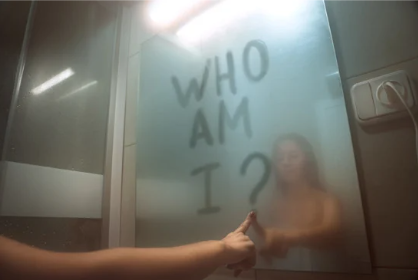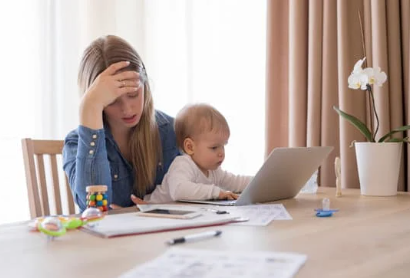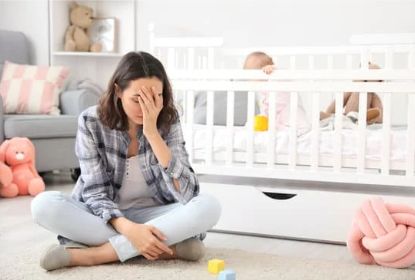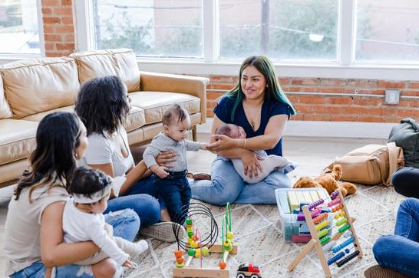Overcoming Identity Loss in Motherhood
November 18, 2024
Postpartum Identity Crisis: Reconnecting with Your Identity in Early Motherhood

When I became a mother, I experienced a huge postpartum identity crisis. After I had my first daughter, I felt the weight of an enormous responsibility—to keep this tiny, precious little person safe and protected. Every decision and every action, seemed to revolve around her well-being. I wanted her to feel safe, loved, and happy. But with that drive came emotional overwhelm. The responsibility consumed me, and soon, I began to feel like I was losing my sense of self. The parts of me that I once called a wife, partner, friend, and community member started fading. My entire identity felt tied to being a mother. A motherhood identity shift.
If you’ve felt a similar sense of losing yourself, know that you’re not alone.
Motherhood changes us-overnight, from our personal values to how we view ourselves and make decisions.
Understanding the Overwhelm and Identity Shift in Motherhood

With the combination of hormonal shifts, sleep deprivation, and the responsibility of caring for a newborn, the emotional overwhelm of motherhood is overwhelming. This feeling is common, and it doesn’t mean there’s something “wrong” with you (even though it feels like there is).
Karen Kleiman, an expert in maternal mental health, describes this as the “motherhood identity shift”—a transition where a mother’s personal identity becomes deeply intertwined with her role as a caregiver.
Kleiman writes that while this shift is natural, it can lead to confusion, loss, and even guilt as mothers try figure out who they are becoming along with the demands of motherhood. Naming this the “motherhood identity shift” helps to validate that these feelings are common and part of adjusting to your new role.
“This is normal…but that doesn’t mean I like it!”
I want you to consider this…
There isn’t something inherently wrong with you because you are experiencing this. It is so important to be self compassionate and aware of what you say to yourself about what you’re experiencing. “I don’t know what’s wrong with me”, “I can’t handle this”, “I should never have become a mother” are common phrases when we stop and listen closely. If we don’t catch ourselves in this narrative, we start to believe it to be true, instead of realizing that it is a symptom of the emotional overwhelm.
Consider the following:
Common Factors Contributing to Identity Loss in Motherhood

1. Biological Changes and Hormones
Motherhood brings incredible physical and hormonal changes. Your body is adjusting to major shifts, and hormonal fluctuations can amplify feelings of sadness, anxiety, and exhaustion. This isn’t something within your control—it’s biology. When you add sleep deprivation to the mix, feeling overwhelmed becomes more likely, as your brain doesn’t have the rest it needs to process emotions fully.
2. Sudden Increase in Responsibilities
The responsibility of meeting every need of a tiny human is immense. Even when you love your baby, the constant demands can weigh heavily on you, making it easy to feel like you’re drowning under the pressure. You’re adjusting to being someone’s everything, which can feel both beautiful and overwhelming.
3. Identity Shift: From “You” to “Mom”
Before motherhood, you may have identified as a professional, a partner, a friend, or simply as yourself. Now, “mom” is often the first identity that comes to mind, overshadowing those other parts of who you are. It’s natural to feel a sense of disorientation and even grief for the “you” that existed before. This change can feel like an intense loss of self, leaving you wondering if you’ll ever reconnect with who you once were.
Navigating External Pressures and Internal Expectations

Society often glamorizes parenthood, making it look effortless and joyful. Seeing images on social media or hearing stories from other moms can make you feel like you should be able to handle it all, from maintaining a career to being a present partner and friend. This pressure to “do it all” can leave you feeling exhausted and guilty for not feeling constant joy. But remember, this idealized image doesn’t show the full picture of motherhood’s challenges.
The Power of Self-Compassion and Letting Go of Guilt

Feelings like sadness, anxiety, and overwhelm are reactions to a significant life shift, not a reflection of your ability to be a good mom. Guilt often intensifies these feelings, leaving you trapped by both the demands of motherhood and the weight of your self-judgment. Self-compassion—offering yourself patience, understanding, and kindness—can help break this cycle.
Grant yourself “permission to feel,” a concept Kleiman advocates for in her work. This means allowing yourself to experience the full range of emotions without guilt or shame. Being a mother doesn’t mean you can’t feel frustration, resentment, or sadness alongside love and joy. By recognizing these feelings as normal, you free yourself from the pressure to be constantly happy and fulfilled.
Steps to Reconnect with Your Identity

Reconnecting with your identity doesn’t require a complete change of who you are and the way you do things. As Dr. Amy Wenzel suggests, “small acts of self-connection” can help you feel more grounded.
1. Take Daily Pauses for Self-Reflection
Spend a few minutes each day checking in with yourself by asking:
- What am I feeling right now?
- What would bring me joy in this moment?
- What am I learning about myself by the experiences I am enduring?
These small pauses can help you reconnect with your needs and feelings, creating space for your inner voice to be heard.
2. Journal Your Thoughts and Emotions
Journaling the answers to these thoughts can be a powerful way to process the ups and downs of motherhood. Write about small wins, challenges, or anything that resonates with you. This practice can help you identify parts of your identity you may want to nurture or reconnect with over time. It also helps you process your thoughts instead of ignoring them or detaching yourself from them.
3. Practice Small Acts of Self-Care
Reward yourself with something that feels like you. Whether it’s listening to a favorite song, reading a chapter of a beloved book, or stepping outside for fresh air, these moments help you reconnect with the person you are outside of your role as a mother.
4. Set Personal Goals
Consider setting small, achievable goals that bring you a sense of purpose. Whether it’s learning something new or planning an activity, these personal goals can reintroduce you to your unique identity, even when motherhood feels all-consuming.
Building Self-Compassion: Releasing Guilt and Embracing Yourself
Self-compassion means to give yourself the space to experience motherhood authentically, without comparing yourself. Be aware of your guilty thoughts that say you “should” be constantly happy, capable, or grateful. By recognizing that these feelings are part of your emotional experience, you can embrace your journey with greater kindness and resilience.
Guilt often stems from not meeting “perceived” expectations. This sense of guilt intensifies the emotional load, leaving you feeling trapped. Being aware of this internal dialogue and transitioning it with a new compassionate perception can help you avoid turning ordinary feelings of sadness or frustration into a sense of inadequacy.
Seeking Support and Connection for Postpartum Identity

Motherhood is an intense journey that doesn’t have to be walked alone. Finding a support network can remind you that you’re not alone. Reach out to friends, join a local moms’ group, or explore resources like Postpartum Support International for support groups and helpful tools. Talk with people in your community who can provide you insight and connections. Mention it to your doctor or pediatrician, they might know some great community resources as well. There are also helpful blog posts and resources available on our website www.postpartumnh.com.
Moving Forward: Finding Joy and Fulfillment in Your New Role
Motherhood is filled with highs and lows, and while it may feel overwhelming now, there is a way forward. You have the power to reconnect with yourself, find joy in small moments, and create a fulfilling experience for you and your family. It’s not about perfection; it’s about kindness to yourself, realistic expectations, and small, meaningful steps that honor your needs and your role as a mother.
Remember, you are both “mom” and you. This journey allows you to redefine both, weaving together your past self and the person you’re becoming. Take it one day at a time, and remember that you’re not alone in this journey. The balance between motherhood and self may be challenging, but it’s one filled with immense possibility and profound reward.
Recommended Reading: Understanding the Postpartum Identity Shift
If you know me, I always like to recommend some great books to add value and education to enhance understanding and healing. Here are a few books I recommend. A few I haven’t had a chance to read myself but come highly recommended. Each will explore the “motherhood identity shift” and postpartum mental health.
- “Good Moms Have Scary Thoughts: A Healing Guide to the Secret Fears of New Mothers”
This visually engaging guide provides compassionate advice and validation for mothers experiencing intrusive thoughts and emotional struggles, reminding them they are not alone. - “This Isn’t What I Expected: Overcoming Postpartum Depression”
Co-written with Valerie Raskin, this empathetic guide offers practical strategies for mothers dealing with postpartum depression and anxiety. - “Coping with Infertility, Miscarriage, and Neonatal Loss: Finding Perspective and Creating Meaning”
While centered on loss, this book also addresses the emotional and identity-related challenges that arise in the perinatal period. - “Motherhood: Facing and Finding Yourself” by Lisa Marchiano
This thoughtful exploration delves into the psychological transformation of motherhood, drawing on stories and Jungian psychology to help mothers understand their evolving identity. - “The Postpartum Husband: Practical Solutions for Living with Postpartum Depression” by Karen Kleiman
While written for partners, this book also offers insights for mothers about navigating identity shifts and mental health challenges with support. - “Matrescence: On the Metamorphosis of Becoming a Mother” by Lucy Jones
Exploring the concept of “matrescence” (the process of transitioning into motherhood), this book highlights the parallels to adolescence and the profound identity changes it brings. - “And Now We Have Everything: On Motherhood Before I Was Ready” by Meaghan O’Connell
A raw and honest account of one woman’s journey through the emotional and identity struggles of early motherhood. - “Your Baby, Your Way: Taking Charge of Your Pregnancy, Childbirth, and Parenting Decisions for a Happier, Healthier Family” by Jennifer Margulis
This empowering guide encourages mothers to reclaim their sense of self and make informed, confident choices throughout motherhood.
[…] we actively choose how we spend our time and energy, we create space for joy and identity—even in the busiest […]